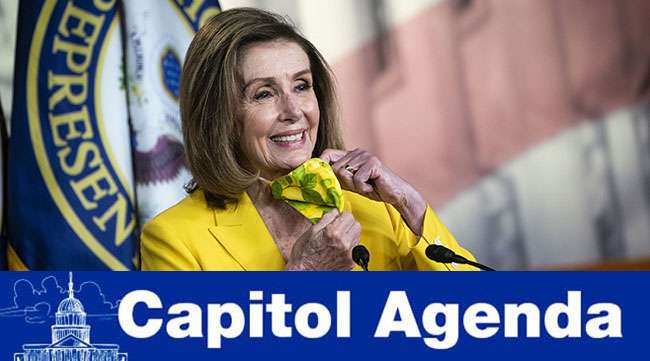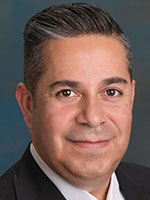Senior Reporter
Pelosi Promotes Biden’s Infrastructure Plan

[Stay on top of transportation news: Get TTNews in your inbox.]
With a U.S. House committee gearing up to consider a multiyear highway policy bill this month, the chamber’s Democratic leader touted the president’s comprehensive gameplan for modernizing the country’s transportation networks.
As President Joe Biden champions his $2.25 trillion policy pitch to Congress, House Speaker Nancy Pelosi (D-Calif.) is insisting that approving the plan would pave the way for major advancements in the way people connect.
Under the president’s proposal, called the American Jobs Plan, $115 billion would go toward highways and bridges, with $85 billion being dedicated for transit systems. To fund much of the plan, the corporate tax rate would increase from 21% to 28%. Besides its emphasis on highways and transit, it would authorize construction of infrastructure capable of withstanding the impact of severe weather events. The plan also would focus on enhancing access to broadband internet in rural communities.

Mulero
“It’s really important to note that if you’re going to build the infrastructure of America for the future, it’s not just roads, bridges, mass transit. All that, that’s all very important. It’s water systems. It’s schools. It’s housing. It’s broadband, broadband, broadband: a very significant part of our package,” Pelosi said April 29.
“As we go forward, if we’re going to build back better, we have to do so with a strong workforce development piece,” the speaker continued. “The personal infrastructure must be built in order for the physical infrastructure to involve everyone in its success. And that’s why whether it’s women, minority, people of color, veterans, rural, Native American communities, as well as businesses; must be able to participate in all of that.”
House Democrats’ aim when they consider a multiyear highway bill this month will be to promote modernization and authorize funding for certain projects via earmarks, explained Peter DeFazio (D-Ore.), the transportation panel’s chairman. The highway policy legislation, meant to update provisions in a soon-to-expire federal highway law, is a pillar of the president’s infrastructure plan. Earmarks, a practice banned for a decade, entails directing federal spending for a specific infrastructure project.
Earmarks Instruction Booklet by Transport Topics on Scribd
As DeFazio indicated, “Our [highway] bill will propose transformational investments to move our infrastructure and transportation systems out of the Eisenhower era and into the modern era, with a focus on creating infrastructure resilient to our changing climate, electrifying our highway system, reconnecting communities and creating opportunity, moving projects across the finish line, and making historic investments in transit, rail, and other cleaner mobility options as we push toward a zero-carbon-pollution transportation sector.”
Senior Republicans, meanwhile, continue to push back due to the plan’s price tag and proposed corporate tax increase. Sen. Shelley Moore Capito (R-W.Va.), ranking member on the Senate transportation panel, is leading her caucus’ negotiations on infrastructure. The Republicans recently unveiled a nearly $600 billion infrastructure blueprint, viewed as an alternative to Biden’s plan.
Said Capito: “I’m going to keep going in and fighting for Republican principles and a narrowing of a focus of a more reasonable, common-sense infrastructure package.”
The Week Ahead (All times Eastern)
May 3, noon: The House Appropriations Energy and Water Development, and Related Agencies Subcommittee meets for a “members’ day” hearing.
May 4, 11 a.m.: The House Energy Subcommittee meets for a hearing on climate change.
May 4, noon: The House Housing, Community Development, and Insurance Subcommittee meets for a hearing titled, “Built to Last: Examining Housing Resilience in the Face of Climate Change.” Watch live here.
May 5, 11:30 a.m.: The House Energy Subcommittee meets for a hearing titled, “The CLEAN Future Act: Driving Decarbonization of the Transportation Sector.”
May 6, 11 a.m.: The House Railroads, Pipelines and Hazardous Materials Subcommittee meets for a hearing on high-speed rail.
May 6, noon: The Brookings Institution hosts Rep. Rosa DeLauro (D-Conn.), chairwoman of the Appropriations Committee.
Freight Corridor
There’s a big push happening with regard to federal infrastructure policy measures.
Legislative Docket

Luján
Sens. Ben Luján (D-N.M.) and Rick Scott (R-Fla.) recently introduced the Reduce Impaired Driving for Everyone, or RIDE, Act. The legislation would promote research and development of advanced alcohol detection technology and require auto manufacturers to implement certain technology in new cars.
“Drunk driving has brought pain into the homes of too many New Mexicans. Across the country, thousands of families mourn the loss of loved ones in drunk driving crashes that can be prevented with the deployment of cutting-edge technologies. This can change if Congress takes action, and that’s what the RIDE Act sets out to do,” said Luján, a member of the Commerce Committee. “This bipartisan legislation is a major effort to end drunk driving, keep our highways safe and prevent needless deaths.”
 Buzz
Buzz

The leadership of the House Transportation panel is reviewing requests for earmarks, known as member designated projects.
Favorite Video
A new chapter in the mask saga.
Favorite Tweet
Imagine the ability to calculate traffic.
https://t.co/r3csqFyVKs — Streetsblog USA (@StreetsblogUSA) April 28, 2021
The Last Word
Throughout our history, if you think about it, public investment and infrastructure has literally transformed America.
President Joe Biden on April 28
We publish weekly when Congress is in session. E-mail emulero@ttnews.com with tips. Follow us @eugenemulero and @transporttopics.
Want more news? Listen to today's daily briefing below or go here for more info:



